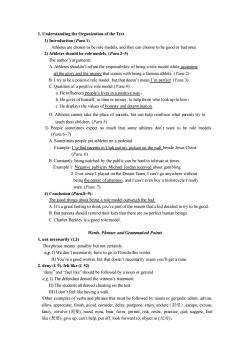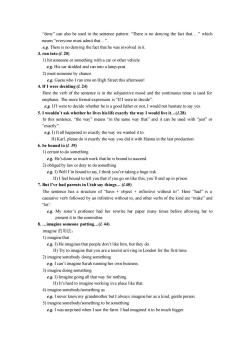《新编大学英语》综合教程(第三版第四册)B4U5_Vocabulary and grammar

1.Understanding the Organization of the Text 1)Introduction (Para.1) Athletes are chosen to be role models,and they can choose to be good or bad ones. 2)Athletes should be role models.(Para.2-5) The author's arguments: A.Athletes shouldn't refuse the responsibility of being a role model while accepting all the glory and the money that comes with being a famous athlete.(Para.2) B.I try to be a positive role model,but that doesn't mean I'm perfect.(Para.3) C.Qualities of a positive role model (Para.4): a.He influences people's lives in a positive way: b.He gives of himself,in time or money,to help those who look up to him: c.He displays the values of honesty and determination. D.Athletes cannot take the place of parents,but can help reinforce what parents try to teach their children.(Para.5) 3)People sometimes expect so much that some athletes don't want to be role models. (Para.6-7) A.Sometimes people put athletes on a pedestal. Example:I've had parents in Utah put my picture on the wall beside Jesus Christ. (Para.6) B.Constantly being watched by the public can be hard to tolerate at times. Example 1:Negative publicity Michael Jordan received about gambling 2:Ever since I played on the Dream Team,I can't go anywhere without being the center of attention,and I can't even buy a motorcycle I really want.(Para.7) 4)Conclusion (Para.8-9): The good things about being a role model outweigh the bad. A.It's a great feeling to think you're part of the reason that a kid decided to try to be good. B.But parents should remind their kids that there are no perfect human beings. C.Charles Barkley is a good role model. Words,Phrases and Grammatical Points 1.not necessarily (1.3) This phrase means:possibly but not certainly. e.g.I)We don't necessarily have to go to Florida this winter. II)You're a good worker,but that doesn't necessarily mean you'll get a raise. 2.deny (1.9),felt like (1.52) “deny”and“feel like”should be followed by a noun or gerund e.g.I)The defendant denied the witness's statement. II)The students all denied cheating on the test. III)I don't feel like having a walk. Other examples of verbs and phrases that must be followed by nouns or gerunds:admit,advise, allow,appreciate,finish,avoid,consider,delay,postpone,enjoy,endure ()escape,excuse, fancy,involve ()mind,miss,bear,favor,permit,risk,resist,practice,quit,suggest,feel Iike(想要),give up,can't help,put off,look forward to,object to(反对)
1. Understanding the Organization of the Text 1) Introduction (Para.1) Athletes are chosen to be role models, and they can choose to be good or bad ones. 2) Athletes should be role models. (Para.2~5) The author’s arguments: A. Athletes shouldn’t refuse the responsibility of being a role model while accepting all the glory and the money that comes with being a famous athlete. (Para.2) B. I try to be a positive role model, but that doesn’t mean I’m perfect. (Para.3) C. Qualities of a positive role model (Para.4): a. He influences people’s lives in a positive way; b. He gives of himself, in time or money, to help those who look up to him; c. He displays the values of honesty and determination. D. Athletes cannot take the place of parents, but can help reinforce what parents try to teach their children. (Para.5) 3) People sometimes expect so much that some athletes don’t want to be role models. (Para.6~7) A. Sometimes people put athletes on a pedestal. Example: I’ve had parents in Utah put my picture on the wall beside Jesus Christ. (Para. 6) B. Constantly being watched by the public can be hard to tolerate at times. Example 1: Negative publicity Michael Jordan received about gambling 2: Ever since I played on the Dream Team, I can’t go anywhere without being the center of attention, and I can’t even buy a motorcycle I really want. (Para. 7) 4) Conclusion (Para.8~9): The good things about being a role model outweigh the bad. A. It’s a great feeling to think you’re part of the reason that a kid decided to try to be good. B. But parents should remind their kids that there are no perfect human beings. C. Charles Barkley is a good role model. Words, Phrases and Grammatical Points 1. not necessarily (l.3) This phrase means: possibly but not certainly. e.g. I) We don’t necessarily have to go to Florida this winter. II) You’re a good worker, but that doesn’t necessarily mean you’ll get a raise. 2. deny (l. 9), felt like (l. 52) “deny” and “feel like” should be followed by a noun or gerund. e.g. I) The defendant denied the witness’s statement. II) The students all denied cheating on the test. III) I don’t feel like having a walk. Other examples of verbs and phrases that must be followed by nouns or gerunds: admit, advise, allow, appreciate, finish, avoid, consider, delay, postpone, enjoy, endure(忍受), escape, excuse, fancy, involve (需要), mind, miss, bear, favor, permit, risk, resist, practice, quit, suggest, feel like (想要), give up, can’t help, put off, look forward to, object to (反对)

"deny"can also be used in the sentence pattern:"There is no denying the fact that...."which means“everyone must admit that.”. eg.There is no denying the fact that he was involved in it. 3.run into(亿.20) 1)hit someone or something with a car or other vehicle eg.His car skidded and ran into a lamp-post. 2)meet someone by chance e.g.Guess who I ran into on High Street this afternoon! 4.If I were deciding(L.24) Here the verb of the sentence is in the subjunctive mood and the continuous tense is used for emphasis.The more formal expression is"If I were to decide". e.g.IfI were to decide whether he is a good father or not,I would not hesitate to say yes. 5.I wouldn't ask whether he lives his life exactly the way I would live it...(1.28) In this sentence,."the way'”means“in the same way that'”and it can be used with"just”or exactly”. e.g.I)It all happened in exactly the way we wanted it to. II)Karl,please do it exactly the way you did it with Hanna in the last production. 6.be bound to (L.39) 1)certain to do something e.g.He's done so much work that he is bound to succeed. 2)obliged by law or duty to do something e.g.I)Well I'm bound to say,I think you're taking a huge risk II)I feel bound to tell you that if you go on like this,you'll end up in prison. 7.But I've had parents in Utah say things...(140) The sentence has a structure of“have+object+infinitive without to”,Here“had”isa causative verb followed by an infinitive without to,and other verbs of the kind are"make"and "let'. e.g.My sister's professor had her rewrite her paper many times before allowing her to present it to the committee. 8....imagine someone putting...(1.44) imagine的用法: 1)imagine that e.g.I)He imagines that people don't like him,but they do. Il)Try to imagine that you are a tourist arriving in London for the first time. 2)imagine somebody doing something e.g.I can't imagine Sarah running her own business. 3)imagine doing something e.g.I)Imagine going all that way for nothing. I1)It's hard to imagine working in a place like that. 4)imagine somebody/something as e.g.I never knew my grandmother but I always imagine her as a kind,gentle person. 5)imagine somebody/something to be something e.g.I was surprised when I saw the farm.I had imagined it to be much bigger
“deny” can also be used in the sentence pattern: “There is no denying the fact that….” which means “everyone must admit that…”. e.g. There is no denying the fact that he was involved in it. 3. run into (l. 20) 1) hit someone or something with a car or other vehicle e.g. His car skidded and ran into a lamp-post. 2) meet someone by chance e.g. Guess who I ran into on High Street this afternoon! 4. If I were deciding (l. 24) Here the verb of the sentence is in the subjunctive mood and the continuous tense is used for emphasis. The more formal expression is “If I were to decide”. e.g. If I were to decide whether he is a good father or not, I would not hesitate to say yes. 5. I wouldn’t ask whether he lives his life exactly the way I would live it…(l.28) In this sentence, “the way” means “in the same way that” and it can be used with “just” or “exactly”. e.g. I) It all happened in exactly the way we wanted it to. II) Karl, please do it exactly the way you did it with Hanna in the last production. 6. be bound to (l. 39) 1) certain to do something e.g. He’s done so much work that he is bound to succeed. 2) obliged by law or duty to do something e.g. I) Well I’m bound to say, I think you’re taking a huge risk. II) I feel bound to tell you that if you go on like this, you’ll end up in prison. 7. But I’ve had parents in Utah say things… (l.40) The sentence has a structure of “have + object + infinitive without to”. Here “had” is a causative verb followed by an infinitive without to, and other verbs of the kind are “make” and “let’. e.g. My sister’s professor had her rewrite her paper many times before allowing her to present it to the committee. 8. …imagine someone putting…(l. 44) imagine 的用法: 1) imagine that e.g. I) He imagines that people don’t like him, but they do. II) Try to imagine that you are a tourist arriving in London for the first time. 2) imagine somebody doing something e.g. I can’t imagine Sarah running her own business. 3) imagine doing something e.g. I) Imagine going all that way for nothing. II) It’s hard to imagine working in a place like that. 4) imagine somebody/something as e.g. I never knew my grandmother but I always imagine her as a kind, gentle person. 5) imagine somebody/something to be something e.g. I was surprised when I saw the farm. I had imagined it to be much bigger
按次数下载不扣除下载券;
注册用户24小时内重复下载只扣除一次;
顺序:VIP每日次数-->可用次数-->下载券;
- 《新编大学英语》综合教程(第三版第四册)B4U5_self-market_self-writing_图表作文常用开头句.doc
- 《新编大学英语》综合教程(第三版第四册)B4U5_self-market_self-watching_rich list.doc
- 《新编大学英语》综合教程(第三版第四册)B4U5_self-market_self-reading_true role models.doc
- 《新编大学英语》综合教程(第三版第四册)B4U5_self-market_self-listening_2000sydney.doc
- 《新编大学英语》综合教程(第三版第四册)B4U5_self-market_quiz_Quiz.ppt
- 《新编大学英语》综合教程(第三版第四册)B4U5_self-market_B4U05 quiz.doc
- 《新编大学英语》综合教程(第三版第四册)B4U5_background information.doc
- 《新编大学英语》综合教程(第三版第四册)B4U5 Translation & Writing.ppt
- 《新编大学英语》综合教程(第三版第四册)B4U5 Read by critical thinking.ppt
- 《新编大学英语》综合教程(第三版第四册)B4U5 Menu.ppt
- 《新编大学英语》综合教程(第三版第四册)B4U5 Activate.ppt
- 《新编大学英语》综合教程(第三版第四册)B4U4_self-market_vocabulary and structure.doc
- 《新编大学英语》综合教程(第三版第四册)B4U4_self-market_self-writing_如何写分论点(2).doc
- 《新编大学英语》综合教程(第三版第四册)B4U4_self-market_self-reading_Unleashing the power of creativity.doc
- 《新编大学英语》综合教程(第三版第四册)B4U4_self-market_self-reading_Enhancing Creativity in your children by blogging.doc
- 《新编大学英语》综合教程(第三版第四册)B4U4_self-market_self-reading_16 habits of highly creative people.doc
- 《新编大学英语》综合教程(第三版第四册)B4U4_self-market_self-listening_never too young.doc
- 《新编大学英语》综合教程(第三版第四册)B4U4_self-market_background information.doc
- 《新编大学英语》综合教程(第三版第四册)B4U4_self-market_06B404 QUIZ_Unit Four QUIZ.doc
- 《新编大学英语》综合教程(第三版第四册)B4U4_self-market_06B404 QUIZ_sentence unit4.ppt
- 《新编大学英语》综合教程(第三版第四册)B4U6 Activate.ppt
- 《新编大学英语》综合教程(第三版第四册)B4U6 Menu.ppt
- 《新编大学英语》综合教程(第三版第四册)B4U6 Read by critical thinking.ppt
- 《新编大学英语》综合教程(第三版第四册)B4U6 Translation & Writing.ppt
- 《新编大学英语》综合教程(第三版第四册)B4U6_Background information.doc
- 《新编大学英语》综合教程(第三版第四册)B4U6_self-market_oral quiz.ppt
- 《新编大学英语》综合教程(第三版第四册)B4U6_self-market_quiz_B4U06 Quiz.doc
- 《新编大学英语》综合教程(第三版第四册)B4U6_self-market_self-listening_a pilot's job.doc
- 《新编大学英语》综合教程(第三版第四册)B4U6_self-market_self-listening_Words you need to know.doc
- 《新编大学英语》综合教程(第三版第四册)B4U6_self-market_self-reading_Why would people like to take risks.doc
- 《新编大学英语》综合教程(第三版第四册)B4U6_self-market_self-writing_图表作文常用结尾句.doc
- 《新编大学英语》综合教程(第三版第四册)B4U6_Words, phrases and grammarical points.doc
- 《新编大学英语》综合教程(第三版第四册)B4U2_self-market_For Teacher, B4U2.doc
- 《大学英语》课程PPT教学课件(学术英语综合)Unit 01 Economics(Academic English - An Integrated Course for Undergraduates).ppt
- 《大学英语》课程PPT教学课件(学术英语综合)Unit 02 Business Ethics.ppt
- 《大学英语》课程PPT教学课件(学术英语综合)Unit 10 Language Acquisition.ppt
- 《大学英语》课程PPT教学课件(学术英语综合)Unit 03 Psychology.ppt
- 《大学英语》课程PPT教学课件(学术英语综合)Unit 04 Environment.ppt
- 《大学英语》课程PPT教学课件(学术英语综合)Unit 05 Philosophy.ppt
- 《大学英语》课程PPT教学课件(学术英语综合)Unit 06 Mathematics.ppt
